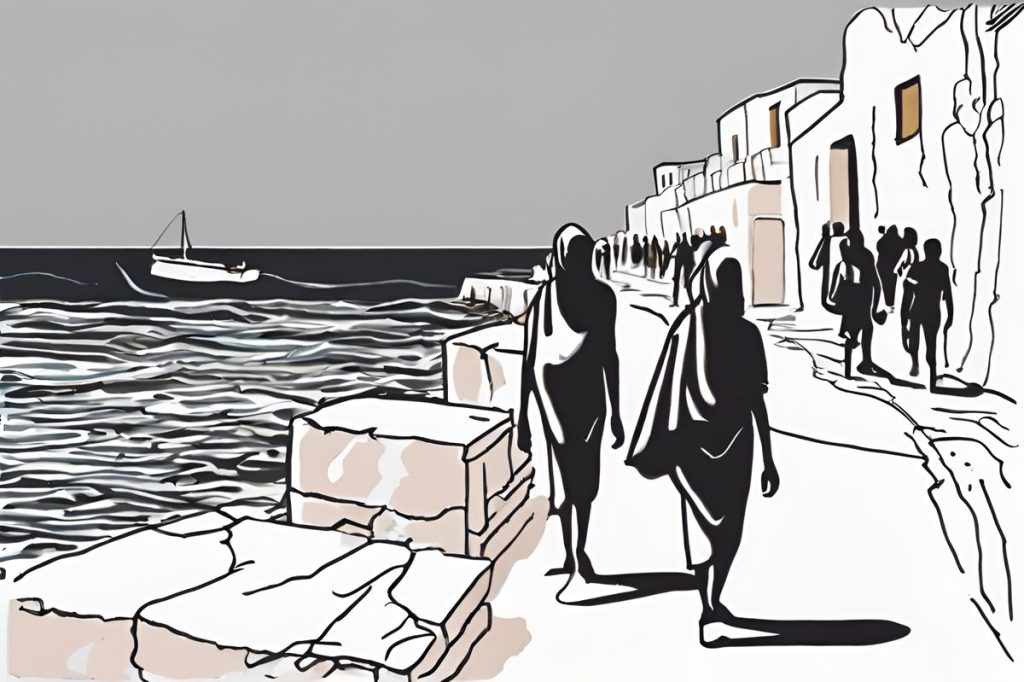Amidst the waves near Cape Greco, a group of 141 individuals, predominantly Syrian refugees, arrived seeking safety on Cyprus shores, highlighting the ongoing humanitarian challenge in the Mediterranean. The Pournara Reception Centre offers initial support, but the surge in arrivals underscores the need for regional cooperation and comprehensive policies to ensure the migrants’ safety, dignity, and integration into host societies.
What is the ongoing humanitarian challenge at Cape Greco?
The humanitarian challenge at Cape Greco involves managing the arrival and support of migrants and refugees, mainly from Syria. The Pournara Reception Centre in Cyprus provides initial shelter and services. However, the surge in arrivals places strain on resources, highlighting the need for regional cooperation and comprehensive policies to ensure the migrants’ safety, dignity, and integration into host societies.
Migrants’ Arrival and Support
On a fateful Friday night, two vessels were detected off the coast near Cape Greco. The Port Police swiftly responded, and the following day, these boats, carrying 141 individuals, safely reached the shore. Onboard was a diverse group: 92 men, 12 women, and 37 children, among which 12 were unaccompanied minors.
The group predominantly consisted of refugees fleeing from the ravages of war in Syria, numbering 138, with one migrant hailing from Lebanon and two from Palestine. Upon their arrival, authorities at Larnaca promptly registered their details. Their journey continued as they were escorted to the Pournara Reception Centre located in Kokkinotrimithia, a facility designed to offer temporary shelter and necessary services to asylum seekers.
Cyprus’ Ongoing Migrant Situation
Cyprus has been a critical point of entry for individuals escaping conflict zones, seeking refuge and a chance at a new life. The latest incident precedes an alarming surge in arrivals; just six days prior, the island witnessed a consecutive inflow of migrant boats, totaling 15 vessels. This recent spike in migratory activity underscores the broader challenges faced by the Mediterranean region in managing humanitarian crises.
Pournara Reception Centre serves as the first point of contact for many who embark on treacherous voyages in search of safety. It provides the initial support, but the center has been under immense strain due to the constant influx of new arrivals. The center’s resources and the local authorities’ capacities are often stretched thin, reflecting a larger, more complex issue that transcends national borders.
Regional Implications and Responsibilities
The Mediterranean has been the backdrop for countless stories of migration, with islands like Cyprus finding themselves on the frontlines. This geographical region has become synonymous with boat crossings, as many migrants place their fate in the hands of the sea, fleeing turmoil in their homelands.
Nations in the vicinity, in cooperation with international bodies, have been urged to share the responsibility. A concerted effort is vital in addressing the root causes of migration, providing support to frontline states, and ensuring the humane treatment of those who arrive at their doors. The European Union has been involved in numerous initiatives aimed at bolstering the response to such situations, emphasizing the need for solidarity and a coordinated approach.
Ensuring Safety and Dignity
Once ashore, the journey is far from over for these individuals. The process of seeking asylum is intricate and often lengthy, entailing legal procedures and the uncertainty of outcomes. Despite the challenges, it’s crucial that every person is treated with the dignity and respect they deserve. They carry with them the hope for a life devoid of conflict and despair.
The international community continues to advocate for comprehensive policies that not only address the immediate needs of the migrants but also integrate long-term solutions for their well-being. Humanitarian aid, legal assistance, and efforts to facilitate integration into host societies are pillars of a robust response to the global refugee and migrant crisis.
In any case, the situation at Cape Greco serves as a poignant reminder of the ongoing human plight and the collective responsibility to provide sanctuary to those in need.
What is the ongoing humanitarian challenge at Cape Greco?
The ongoing humanitarian challenge at Cape Greco involves managing the arrival and support of migrants and refugees, mainly from Syria. The Pournara Reception Centre in Cyprus provides initial shelter and services. However, the surge in arrivals places strain on resources, highlighting the need for regional cooperation and comprehensive policies to ensure the migrants’ safety, dignity, and integration into host societies.
How does Cyprus handle the arrival and support of migrants at Cape Greco?
Upon detection off the coast, the Port Police swiftly respond to vessels carrying migrants. Once arrived, authorities at Larnaca register the details of the individuals, who are then escorted to the Pournara Reception Centre in Kokkinotrimithia. This Centre offers temporary shelter and necessary services to asylum seekers. However, the constant influx of new arrivals strains the center’s resources and the capacities of local authorities.
What are the regional implications and responsibilities regarding the migrant situation in the Mediterranean?
The Mediterranean region, including Cyprus, often serves as a point of entry for migrants fleeing conflict zones. Nations in the vicinity, along with international bodies like the European Union, are urged to share the responsibility. It is essential to address root causes of migration, support frontline states, and ensure the humane treatment of arriving migrants. Solidarity and a coordinated approach are emphasized in responding to such situations.
How can the international community ensure the safety and dignity of migrants arriving at Cape Greco?
The international community advocates for comprehensive policies that address the immediate needs of migrants and refugees while integrating long-term solutions for their well-being. Humanitarian aid, legal assistance, and efforts to facilitate integration into host societies are crucial. Treating every individual with the dignity and respect they deserve is paramount, reflecting a commitment to providing sanctuary to those in need.

